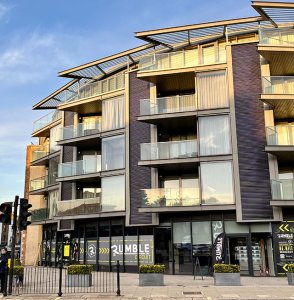Lease Extension Solicitors
Lease Extension Solicitors London
Osbornes Law specialise in lease extensions. Our lease extension lawyers are experts in the process, the legislation and negotiating with the freeholder. Continue reading to find out more about the lease extension process and why it is crucial to use a lawyer who specialises in this area.
What is a lease extension?
The law gives leaseholders of residential property the right to extend the Term of their leases.
If you purchase a leasehold property you do so for a fixed period that is stipulated in the lease, this is known as the “Term”. When the Term ends, the ownership of your property reverts to the landlord.
The remaining Term of a lease affects the value of the property: the shorter the lease, the less the property is worth. So, it is in your interest to either extend the Term of the lease before it expires.
There are 4.5 million leasehold homes in England, and it’s the most common way of owning a flat. Owning the leasehold gives you the right to live in the flat for a set number of years, after which the ownership of the flat will fall back to the landlord. Most residential leases have very long terms – we’re talking 100 years, 250 years or even 999 years – so you’re probably not too worried about the lease running out of time.
If the lease on your flat is getting short – under 80 years is the key age of a lease – don’t worry. You have a legal right to extend it under the Leasehold Reform Housing and Urban Development Act 1993.
Why do I need to extend my lease?
Mortgage companies get very nervous about short leases. When a lease gets under 90 years or so, you will find that your flat is much more difficult to mortgage and sell. This is when you may need to think about extending your lease.
Who is able to extend a lease?
If you have owned your flat for at least two years, you are legally entitled to an extension. The relevant Act is the Leasehold Reform, Housing and Urban Development Act 1993. The Act enforces leaseholders’ right to add 90 years to the lease term and reduce their ground rent to £nil as long as the set procedure under the Act is followed – meaning the freeholder cannot say no.
If you have owned the flat for less than two years, then you can always talk to the landlord informally about adding an extension. You just won’t be able to use the statutory procedure until the two years have passed.
Different rules apply to leasehold houses. See “What if I own a leasehold house?” below.
How much does it cost to extend a lease?
The cost of extending a lease is based on a set formula that takes into account:
- The value of the property
- The number of years left on the lease
- The annual ground rent
- The value of improvements leaseholders have made to the flat
- Other factors like investment returns
It’s a fairly complex calculation, but a surveyor will take care of this for you. We have a free calculator which you can use to get a rough idea of the cost.
The first step in the lease extension process is having a valuation carried out to assess the likely premium payable. Even if you decide to proceed with a voluntary lease extension we would advise you to still take valuation advice to make sure the premium your freeholder is voluntarily offering is a “good deal”.
Instruct an experienced valuer in the enfranchisement field to get reliable advice. It is also important to highlight that when making an offer under the 1993 Act the offer must be a bona fide offer – i.e. a genuine offer. An expert valuer will be able to advise what offer should be made.
What other costs are payable relating to extending a lease?
On top of the lease extension price, you also have to pay:
- Your Legal fees
- Your Surveyor’s fees
- The freeholder’s reasonable legal and surveyor’s fees
- Stamp duty*
- Land Registry fees
*While stamp duty land tax applies to lease extensions, it’s unlikely that you’ll pay it. That’s because the rate is 0% on the first £125,000 of the lease extension premium. The majority of lease extensions come in well below this level of premium.
If you own more than one property and you are paying Stamp Duty on your lease extension you will be liable to pay the additional rates.
When should I extend my lease?
Ideally, you should be thinking about an extension when the lease has around 90 years left to run. Anything under 100 years would usually be flagged as a short lease. But the danger number is 80 years. If the term drops below 80 years – even by just one day – then it becomes much more expensive to extend your lease.
This is because something called ‘marriage value’ kicks in. The marriage value is the increase in the value of the flat once the lease has been extended, which can run to tens of thousands of pounds.
You’ll always pay a premium for adding the extra years to your lease. But if your lease has fallen below 80 years, you’ll have to pay 50% of the marriage value on top of the usual lease extension price which causes extensions under 80 years to be much more expensive.
What are the steps for extending my lease?
It completely depends on your individual circumstances and your freeholder whether you extend voluntarily or under the 1993 Act. However, in our experience, the majority of leaseholders do end up extending under the 1993 Act. The main position of proceeding down the statutory process is that it establishes clear deadlines at every stage so the freeholder cannot drag their feet.
Step 1: Take initial legal advice and instruct a solicitor.
Step 2: Hire a surveyor with expertise in lease extensions and knowledge of the local market. The surveyor will value the lease extension and figure out the price you should be paying.
Step 3: Make a formal offer. You do this by serving an official notice which sets out the price and any new terms to be included in the lease. Your solicitor will draft and serve this for you – you will need to sign the notice.
Step 4: If the landlord asks for a deposit, you’ll need to pay this within 14 days. The deposit is £250 or 10% of the proposed price, whichever is higher.
Step 5: The Landlord will serve a counter-notice which will include a counter offer. This is usually higher than they will eventually accept.
Step 6: Negotiations on the price. Negotiations are usually carried out between the leaseholder and freeholders surveyors and the calculations, etc are within their area of expertise.
Step 7: Whilst or after the price/premium has been agreed the freeholder’s solicitors will draft the lease extension and the terms will be reviewed and negotiated by your solicitor. Under the 1993 Act, you are entitled to a lease on the same terms as your existing lease with some allowance for modernisation.
Step 8: Once everything is agreed – completion and registration at the Land Registry. This is again all organised and handled by your solicitor.
If you cannot agree on the price or lease terms after 6 months, you can ask the Property Tribunal to determine it for you. Very few cases go to the Tribunal but making the application is often necessary to bring the freeholder to the “negotiation table”.
The Leasehold Reform, Housing and Urban Development Act of 1993 gives the leaseholder a right to extend their lease by a further 90 years once they have owned the property for 2 years, however, a buyer may take advantage of the Sellers period of ownership and avoid waiting for 2 years.
If you proceed with a voluntary lease extension then the process is likely to be set by the freeholders themselves. When agreeing to the terms of the lease extension you may be asked to cover the costs of the freeholder’s valuation. Once the premium and terms of the extension are agreed the process involves a lease extension deed being drafted, checked, negotiated and completed. After completion, your lease extension solicitors will also register the lease extension at Land Registry. If you have a mortgage over your property the lender’s consent will be required and a lease extension solicitor will be needed to act on the lender’s behalf.
If you proceed with a statutory lease extension then the process is more involved. Initially, a section 42 notice will be served on the freehold which notifies them that you are relying on your right to seek a lease extension. The section 42 notice will provide an opening offer on the premium payable for the extended term. The freeholders then have a period of two months to serve a counter-notice which will either admit or not admit your right to extend the lease and will either accept the offer made in the section 42 notice or propose a counter offer for a higher premium. There is then a period of 6 months to negotiate the premium and the terms of the new lease before a property tribunal application would need to be made. Once the premium and terms of the lease are agreed then the lease is completed and registered at Land Registry.
How long will it take to extend my lease?
From beginning to end, the statutory process normally takes between 6 and 12 months. Choosing a good solicitor – ideally, one who is a member of the Association of Lease Enfranchisement Practitioners – can speed things up considerably.
Do I need a solicitor to extend my lease?
Yes, you do. Even if you take the informal route and agree on the lease extension terms directly with the freeholder it is important to have a solicitor consider the lease to make sure no new or unreasonable terms are being added to the lease, etc. Also if you have a mortgage over your property they will need to be represented by a solicitor.
If you also choose to extend without taking valuation advice then you could end up paying over the odds for the lease extension.
If you don’t instruct professionals the worst case is that you could end up with an unsellable property because the new lease is onerous or isn’t dealt with correctly.
How can our lease extension solicitors help?
- Buying leasehold properties
- Preparing Deeds of covenant
- Dealing with Licences
- Supplementary lease work
- Landlords selling freehold to leaseholders
Why choose Osbornes Law when extending your lease?
Osbornes Law are founding member and approved lawyers of ALEP, The Association of Leasehold Enfranchisment Practitioners. This kitemark means that we are recognised as experts in lease extensions. We are also approved lawyer of ‘News on the Block’, which is another leading association representing the rights of leaseholders in London and England.
To find out how much will it cost you to extend your lease use our lease extension calculator or contact us and ask for Guy Osborn or Amber Larner-Bird.
Lease Extensions FAQs
Do you have to pay cash for a lease extension or can you add it to a mortgage?
No, you don’t have to have the cash available, you can borrow extra on your mortgage and tie the completion of the lease extension and a mortgage together. Practical discussions have to be had at the start about this however because fees are incurred from the start if you then can’t get a mortgage. The process also usually takes 6-12 months or perhaps more and once terms are all agreed you are supposed to complete within 2 months (with a final completion deadline of 4 months) so there have to be conversations about timelines and when to put in mortgage applications, etc to make sure deadlines aren’t missed.
Does a landlord have to extend a lease?
There are two options when extending a lease – a voluntary agreement with your freeholder(s) or a statutory lease extension where you rely on the right to be able to extend your lease granted in the Leasehold Reform, Housing and Urban Development Act 1993.
A voluntary lease extension – involves you coming to an agreement with your freeholder in regards to the term and premium for extending your lease. There are no set terms the freeholder has to give you and their terms do not have to be “fair and reasonable”. In your circumstances, your freeholder may not be unreasonable or difficult to deal with. We would highlight that freeholders do not have to grant voluntary lease extension and a freeholder may simply say “no” or advise you to extend by serving a notice under the 1993 Act.
A statutory lease extension – as long as you have owned a property for over two years you have the right to extend your lease by 90 years and reduce your ground rent to £nil. As long as you meet the criteria for extending under the 1993 Act a freeholder must grant you a lease on 1993 Act terms.
Can my landlord refuse to extend a lease?
A landlord does not have to extend your lease on a voluntary basis (although they may agree to do so so it is usually best to at least approach your freeholder to make some initial enquiries). However as long as you meet the criteria for extending under the Leasehold Reform, Housing and Urban Development Act 1993 your landlord cannot refuse to extend your lease.
Is the lease extension process different if I already own a share of the freehold?
As freeholders, you are able to extend your leases out of the freehold to 999 years. The procedure involves a deed being drafted, agreed, signed by each leaseholder and director of the freehold company/each freeholder if the freehold is held in your names and then registered at the land registry. If you are looking to extend your lease as a freeholder or co-freeholder you should extend discussing your leases as a group as in practice you usually require each other’s consent and signatures.
Where can I obtain a copy of my lease?
If you need a copy of your lease and you have a mortgage on your property a copy can usually be obtained from your mortgage lender. Your freeholder may also have a copy of your lease and be able to provide you with this.
Alternatively, the Land Registry will hold a copy although a fee will be payable, please visit http://www.landregistry.gov.uk/.
What is the Leasehold Reform, Housing and Urban Development Act 1993?
The 1993 Leasehold Reform Act is the natural progression of an earlier piece of legislation called the Leasehold Reform Act 1967. This was the first important Act to give rights favourable to the owners of leasehold homes.
Before the 1967 Act, leaseholders faced losing their home when their lease came to an end unless they were able to negotiate a new deal with the freeholder. Since freeholders held all the power, they were able to ask for much higher ground rents in exchange for a new lease.
The Leasehold Reform Act 1967 gave the owners of leasehold houses the statutory right to buy the freehold of their home on fair terms. It also gave them the right to a 50-year lease extension free of charge.
The Leasehold Reform, Housing and Urban Development Act 1993 extends this right to flat owners. Under the 1993 Leasehold Reform Act, an individual flat owner can force their landlord to grant a 90-year lease extension, and a critical mass of leaseholders can come together to buy the freehold of their building.
The Act has been adjusted over the years, most notably by the Commonhold and Leasehold Reform Act 2002 which abolished ‘marriage value’ in cases where the lease has more than 80 years to run.
Do lease extension rules apply if I own a leasehold house?
Leasehold houses come under a different law. This gives leaseholders the right to extend their lease by 50 years, rather than 90 years with flats. Crucially, there is no premium payable for a lease extension of a house, but your ground rent might go up substantially.
However, extending the lease of a house is highly unusual – for the simple reason that it’s usually more attractive to buy the freehold so you own the property outright.
This is a complicated area of law. You definitely will need professional help from a solicitor with experience in this area.
Should I wait for new rules to take effect before extending my lease?
In January 2021, the government announced its intention to overhaul the rules for lease extensions which could benefit leaseholders in a number of ways. Under the government’s proposals, leaseholders would have the right to extend their lease by 990 years without any ground rent, and marriage values would be scrapped. This could wipe thousands from the cost of a lease extension.
Given the reforms, you may be wondering if it’s better to wait before starting your lease extension. The problem is, we don’t yet know when the new legislation will come in. It may be months or even years before the changes take place – if ever.
In the meantime, it will be difficult to sell or remortgage flats that are not extended and your leases continue to run down and become more expensive to extend whilst you wait. If your lease length is falling, you may want to avoid the uncertainty. Talk to us today.
Will a lease extension add value to a property even if the existing lease is above 90 years?
This is more of a valuation question but the short simple answer is yes. The shorter the lease becomes the more the value of the flat is affected and the closer the lease becomes to 80 years (or is under 80 years) practically the fewer buyers you will have, etc because buyers are put off by the need and cost to extend.
I have had dealings with Guy Osborn and his colleagues at Osbornes Law since December 2019, during which time I have led a process involving 20 leaseholders in a block of flats in Camden Town. Guy and his colleagues have been impeccably professional, immensely helpful, cordial and attentive. They have always responded quickly and clearly to our queries, and helped us to negotiate the complexities of the process, which has come to a successful conclusion.
It has been nothing but a pleasure to work with Osbornes. I would recommend the firm warmly to anyone.
“Both Amber and Rachael were far more than their jobs required – couldn’t have done this without their expertise and kindness”
"Guy has been so helpful. He responded promptly to my queries, explained things clearly, no jargon, and has been warm and human throughout. I felt well supported and would recommend Osbornes to anyone looking for legal help, their service is excellent and fairly priced."
Professional and communicative throughout the process of becoming a Freehold Company and having a share of said freehold. Both Amber and Siroop spoke in plain English and were most efficient and pleasant to deal with.
Amber was fantastic from start to finish. Efficient, clear and professional. Will certainly be calling on her again.
Guy and his team assisted me with a new lease venture and were an absolute pleasure to work with. A professional & knowledgeable team who offered fast and excellent advice. Highly recommend their services
Lease Extension News & InsightsVIEW ALL
- 11.5.2023
Lease Extension Negligence
What is Lease Extension Negligence? Solicitors Negligence when a Tenant claims a new lease of a flat under the Leasehold...
Read more - 10.5.2023
Leasehold Reform expected by end of 2023
The government announced in 2021 the introduction of various leasehold reforms which will affect the leasehold system for properties in England...
Read more - 7.5.2021
Costly clauses missed by lawyers in leasehold contracts
A mum has been left facing a bill of millions of pounds a year for the ground rent of her...
Read more - 30.1.2021
Making Alterations to a Leasehold Property
What is a Leasehold Property? There are two main types of property in England and Wales, freehold and leasehold property....
Read more - 30.1.2018
Understanding Your Lease
The security of shelter is a basic human requirement and is even more important if we have a family or...
Read more - 31.10.2017
Airbnb – Leaseholders Beware!
The overwhelming popularity of Airbnb is now resulting in a review of the case law relating to short term lets....
Read more









